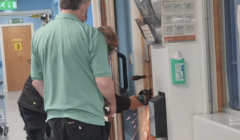Brexit / Brexit poses profound challenges for health service
THE CHIEF executive of NHS Shetland has given assurances that “on a practical day-to-day basis” the local health board is “in a good position” to withstand the impact of the UK leaving the EU on 31 December.
But Michael Dickson expressed grave concern about the long-term consequences of Brexit on the nation’s health service, including potential disruptions in the supply of radioisotopes through Euratom, a key ingredient for the treatment of many cancers.
“On a practical day-to-day basis I think NHS Shetland has done a lot of work and I think we will be in a good position; we’ve got contingency supplies and I am not overly worried about the day-to-day issues that might pop up due to disruptions to trade,” Dickson told Shetland News.
That is not to say that there won’t be any issues and the health board is advising people not to stockpile medicines over the festive period as this may prevent other patients receiving the supplies they need.
“Pharmacies and government will do everything they can to ensure that supplies of medicines remain available for when you need them,” principal pharmacist Mary McFarlane said.
“Health centres will not be providing double prescriptions where this is not necessary.”
“Brexit really poses profound challenges for the future,” Dickson continued saying, “and I hope we can find ways to overcome them, but the key issue right now is the obvious question of whether we will run out of food or medication; will we be able to get vaccine supplies across the Channel,” he said.
However, the more profound impacts of the decision to leave the European Union will be felt in the years to come, the health chief predicted.
“My concerns go much further than the trade deal, which is obviously one part of it. More worryingly is the potential exposure of people to fake medication and the long-term impact of us leaving Euratom,” Dickson said.
Become a member of Shetland News
The European Atomic Energy Community (Euratom) facilitates the consistent supply of radioisotopes which have a range of applications in medicine.
They are vital for diagnosing particular diseases through nuclear medicine imaging techniques, treatment of cancer through radiotherapy, as well as palliative relief of pain, and biochemical analysis in clinical pathology.
“Medical pan-European research of which the UK has been a net beneficiary, we have already started to see some of the impacts of these things,” Dickson said.
“There is that wider concern which is about how we collaborate on research, and how we are not disadvantaged because suddenly we have the American pharmacy companies muscling in on territory that has previously that had previously been a tightly regulated space.
“I would struggle to find anyone who would say that Brexit is a positive step for the NHS, no matter what people have written on buses.”
He said the NHS, particularly in England, has already lost thousands of nurses, doctors and other NHS staff who have decided to return back to EU member states after the UK voted to leave the European Union in June 2016.
Become a member of Shetland News
Shetland News is asking its many readers to consider paying for membership to get additional features and services: -
- Remove non-local ads;
- Bookmark posts to read later;
- Exclusive curated weekly newsletter;
- Hide membership messages;
- Comments open for discussion.
If you appreciate what we do and feel strongly about impartial local journalism, then please become a member of Shetland News by either making a single payment, or setting up a monthly, quarterly or yearly subscription.












































































